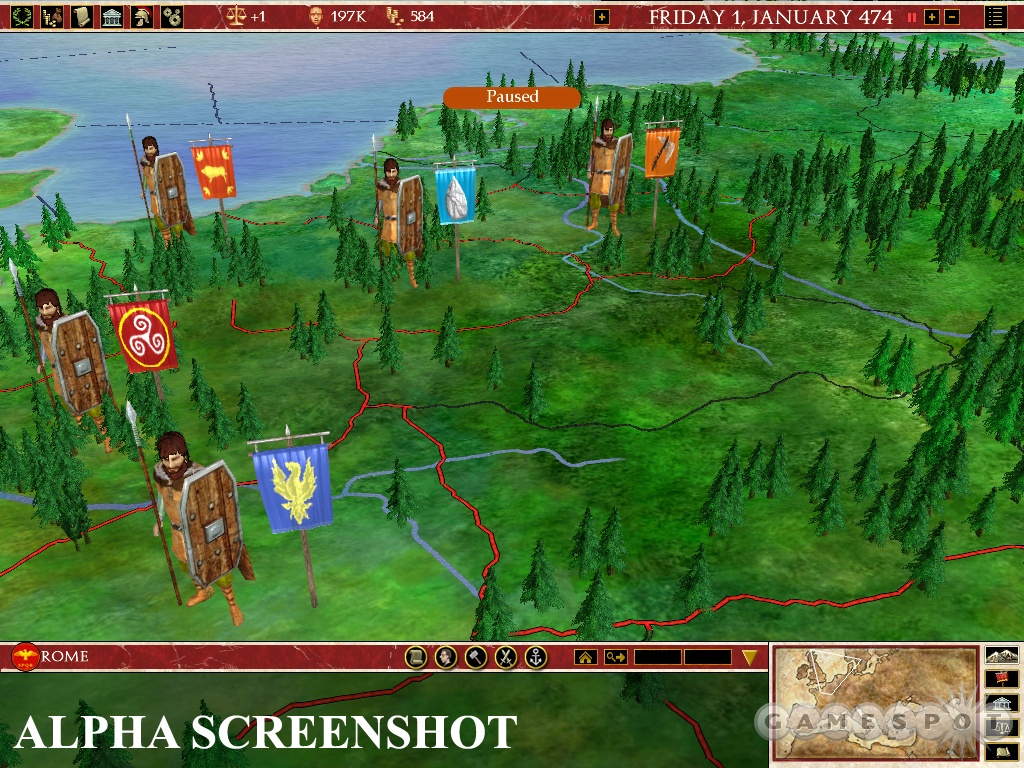Europa Universalis: Rome Q&A - First Details
Get the first details on the next Europa Universalis grand strategy game.
Grand strategy games that model centuries of history across multiple continents can often be complex and intimidating, but the Europa Universalis series has always attempted to bridge the gap between hardcore, high-level strategy, and accessible, dynamic real-time gameplay. The series is now turning its sights to the ancient Roman Empire, with a brand-new setting, new armies, and many more new features. Producer Johan Andersson explains.

GameSpot: Give us an overview of Europa Universalis: Rome.
Johan Andersson: A detailed strategy game with great scope. The entire game is centered on the characters featured in the game, and diplomacy is completely character-driven. People have learnt to expect a game rich in warfare from us, and they will not be disappointed this time around either. Religion also plays a big part, as [religion was] much more [important] back then.
GS: After creating games that modeled world history from the classical and revolutionary eras, why did you decide to turn to the times of the Roman Empire? JA: The Roman era depicts some of the greatest cultural and military civilizations that have ever existed. We felt there was so much more of this era to explore, and that the time period lends itself perfectly to the type of deep and challenging strategy we have specialized in. In addition, we are all fans of the era, which helps immensely, since we will be well familiar with every inch of it after finalizing this project.
GS: We understand that the game will encompass the years 280 BC through 27 BC. What sorts of real-world historical events will we see unfold in the game, and how will they affect it?
JA: There are no historical events as such, but players will be able to experience the creation of empires and the rise of Rome. Players will be able to start at any date, and at the beginning of each game, [conditions] will closely replicate history, but once the game evolves, characters develop and the game will develop with them.
GS: Tell us about the nations that will be available for play in the new game. How will they differ from each other? What will be the greatest strengths available to a nation in a Europa Universalis game set in ancient times?
JA: There will be more than 50 playable nations ranging from Rome itself to smaller Gallic tribes. Of course, we have nations like Carthage, Egypt, and Macedonia as well. We chose 280 BC as our starting point because there was a type of balance between several major nations at that time, and essentially any of those major nations could have created an empire similar to that of Rome. Players will have different resources, geographical locations, characters, and governments at their disposal, which will define their strengths and the capabilities of the nations.
GS: How will players be able to customize their nations' abilities and strengths to their liking?
JA: Players can set up trade routes to get access to other resources, appoint characters to various positions in their nation, elect different national ideas depending on their government type...and [they'll have] many more options. The outcome of Europa Universalis: Rome will completely depend on players' strategic and tactical choices.
GS: Obviously, the new game's time period won't allow for cannons or musketeers, as previous games did. Tell us about the sort of forces players will command in the game.
JA: There are six different units available in the game: militia (standard peasant levy); heavy infantry (such as the legionary); archers (missile troops, such as slingers); cavalry; horse archers (Parthians); and elephant cavalry.
GS: Tell us about the game's fully 3D map and terrain. How will they figure into the gameplay? Will we see Hannibal crossing the Alps, for instance? 
JA: The 3D map and improved terrain adds substantially to the look and feel of the game, and in some instances it will play into [certain] strategies. It's more difficult to open trade routes if your nations are separated by mountains, or to wage war over sea, unless you have a strong fleet. What will be visible to players will depend greatly on the strategies applied.
GS: What specific lessons have you taken away from previous games in the series that you're applying to the development of the new game?
JA: We've found what we believe is the perfect balance between a game with great strategic depth and scope, as well as a certain degree of complexity type, and a game that is easier for players to get into. We've also seen the importance of an intuitive interface, as that means gameplay can be kept intelligent and challenging at the same time as it can be welcoming to new players.
GS: Finally, is there anything else you'd like to add about Europa Universalis: Rome?
JA: "Ceterum censeo Carthaginem esse delendam."
GS: Yes. Thank you for that.
Got a news tip or want to contact us directly? Email news@gamespot.com
Join the conversation